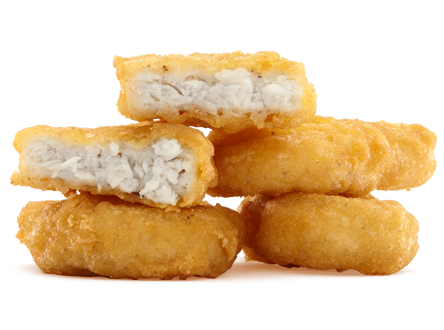
McDonald’s U.S.A. recently announced that it will begin phasing out the purchase and use of chicken treated with antibiotics important to human medicine, a decision which many in the food industry are calling a game-changer. Photo Courtesy of mcdonalds.com.
Earlier this month, McDonald’s USA announced that it would be making some major changes in the chicken and milk the company buys, and many in the food industry are calling this decision a game-changer in the market. Over the next two years, the chain will be phasing out its purchase of chicken raised with antibiotics “important to human medicine,” a practice which makes the animals grow bigger faster. Reuters called this move “the most aggressive step by a major food company to force chicken producers to change practices in the fight against dangerous ‘superbugs.’” McDonald’s also announced that, later this year, the restaurants will begin offering milk from cows not treated with the artificial growth hormone rBST, which makes the animals produce more milk faster.
In fact, McDonald’s was one of the first American fast food chains to encourage antibiotic use by its farmers, and, as also one of the country’s largest buyers of chicken, the decision is all the more radical. The success of other, smaller chains like Chick-fil-A and Chipotle, who already use antibiotic-free chicken, along with a change in consumer focus toward healthier eating, has driven this impactful directive.
Agricultural use of antibiotics is detrimental to human health because it results in the proliferation of antibiotic-resistant diseases in animals and humans. Environmental contamination occurs when the antibiotics end up in rivers, aquifers, and other water supplies, increasing the potential for drug- resistant bacteria. Links between rBST found in milk and cancer have been suggested but not proven, with the American Cancer Society calling the risk for humans “inconclusive.”
McDonald’s sells over 1.5 billion McNuggets a year in 14,000 U.S. restaurants alone. Elsewhere, the practice of adding antibiotics to animal feed for purposes other than treating disease has been banned for several years. The distinction between American and foreign food industries (and the philosophies behind them) is a factor considered by many of today’s McDonald’s customers, those at the Howard Beach location being no exception.
“This is only like the second time I’m getting chicken for her, because in Colombia we don’t like to give fast food to our kids,” said Victoria Carvajal, 29, of Howard Beach. Carvajal’s nearly-three-year-old daughter Gabriella was eagerly munching away on her McNuggets, which came in a Happy Meal.
“She likes this kind, not the kind from the store,” Carvajal explained further, adding that she would most definitely return more often to McDonald’s “if [she] knew the chicken was healthier.”
By Eugénie Bisulco eugenie@theforumnewsgroup.com
